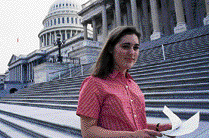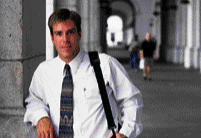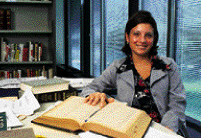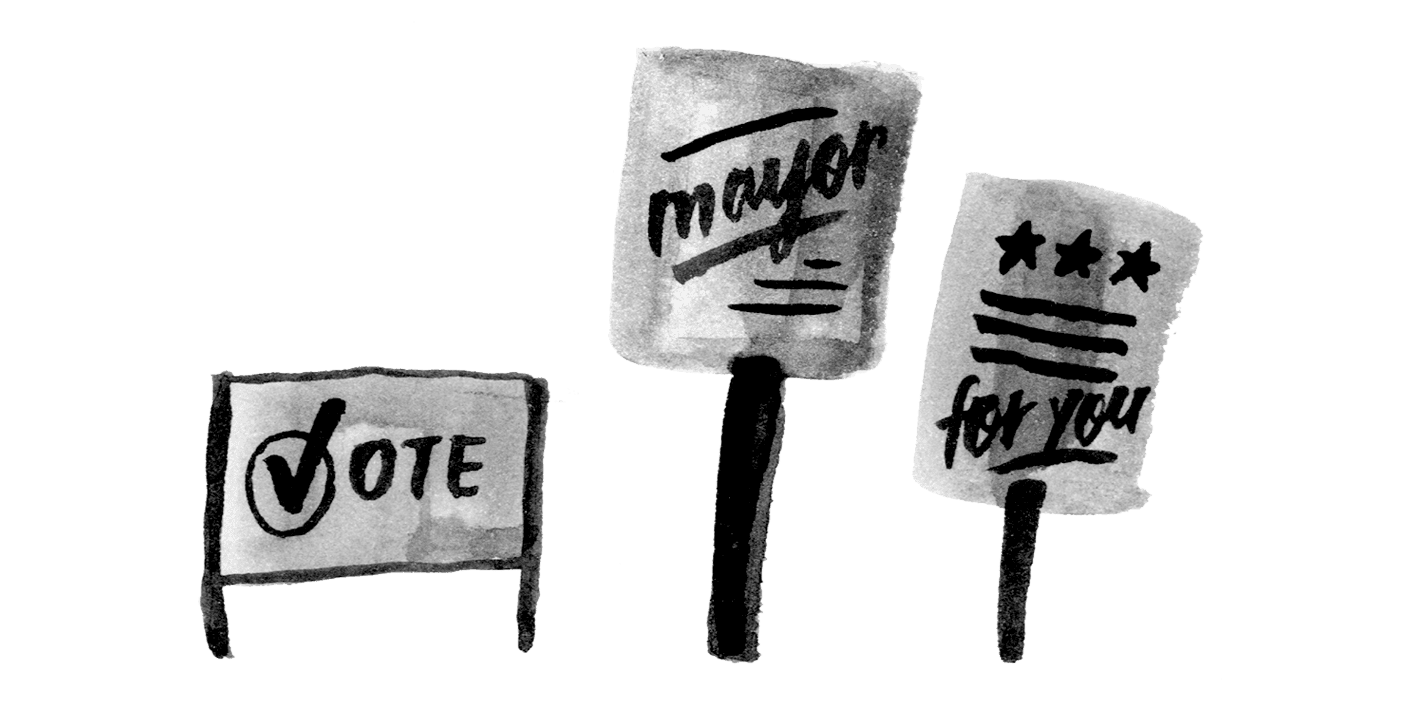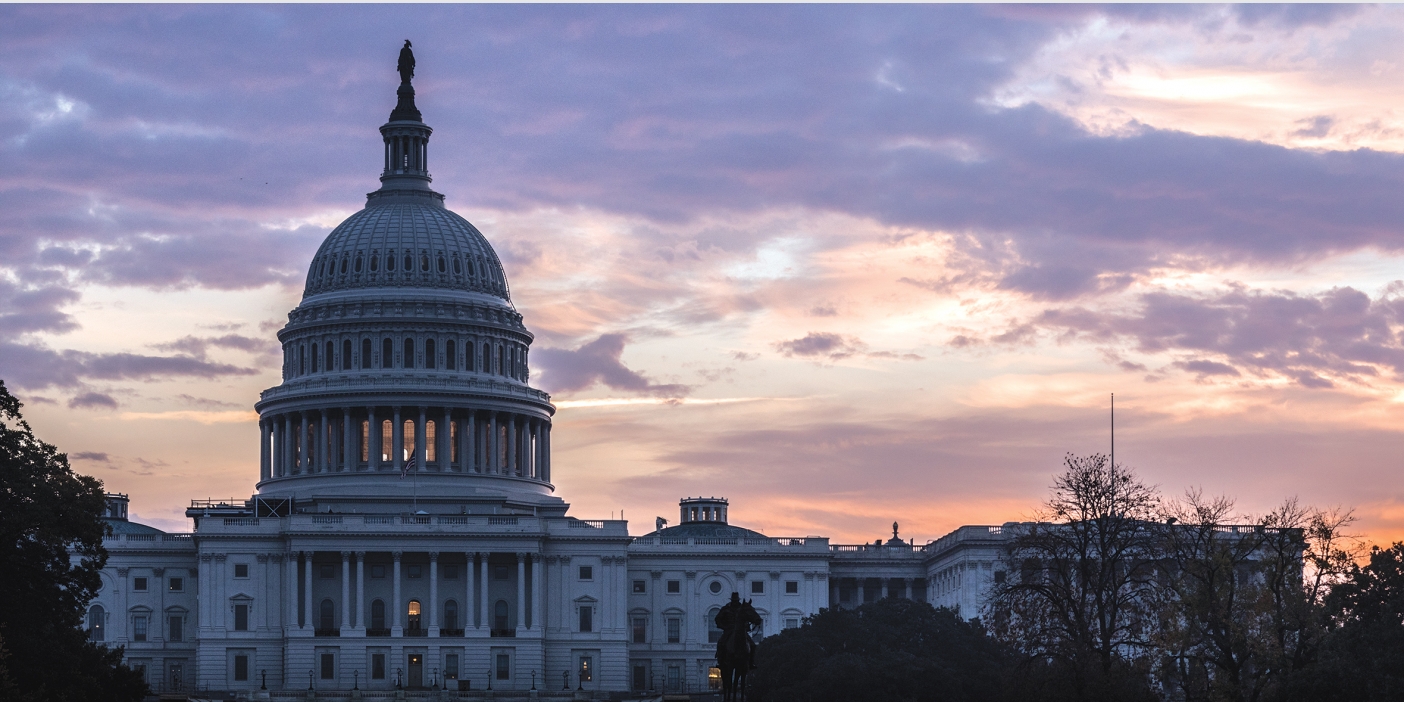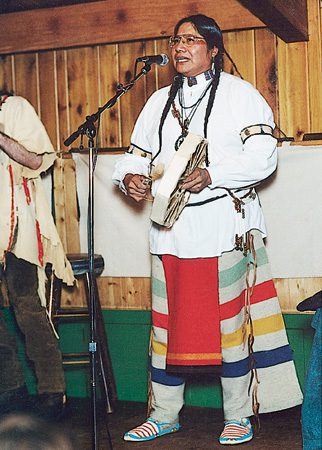In BYU's Washington Seminar, students are thrust into the fast-paced activity of the nation's capital where they observe, first-hand, the inner workings and vision of the country . . . present and past.
Washington, D.C., moves you when you least expect it. Say you’re late for work, stuck in horn-happy traffic on Memorial Bridge when suddenly you see the Jefferson Memorial. It’s stately and noble, a monument to a life of integrity and honor. Everything around you slows. It doesn’t matter that the guy in front of you just cut you off. Jefferson wouldn’t honk, would he? You look just over the crest of the monument and there’s the Capitol, etched against the sky. Pretty soon, you don’t care if you ever get to work. “This,” you say to yourself, “is why I came here.”
No matter what the headlines say, D.C. is an inescapably spiritual place.
At the Korean War Memorial, a spotlight captures a group of life-size figures with heavy guns and camouflage, trudging through rice fields. Their tired faces are etched with apprehension. The inscription at their feet reads: “Our nation honors her sons and daughters who answered the call to defend a country they never knew and a people they never met.”
“When I looked into the faces of those figures I saw memories of home and family,” says BYU student Kristin Lambert of her first visit to the memorial. “I also saw hope for the future. I saw immense courage and strength. War became real to me that night, and I felt a reverence and patriotism I had never felt before.”
Lambert, a junior political science major from Salt Lake City, spent this summer as a participant in BYU’s Washington Seminar. For her internship, Lambert worked with the National Center for Education Statistics, but she learned far more than education or statistics. Such is the case with all stu-dents who participate in the seminar. Since its inception in the early 1970s, the Washington Seminar has sent more than 2,000 BYU students to live, study, work, and learn in the nation’s capital. There, urrounded by monuments, memorials, and the personalities of politics, students not only prepare for careers, they participate in the legwork of running the nation.
BYU Goes to Washington
“Being in Washington is an education in itself,” explains Ray C. Hillam, former chair of BYU’s Political Science Department and founder of the Washington Seminar. As a graduate student in Washington, Hillam had seen that a Washington internship/study experience could be a valuable addition to a student’s education. “I thought, ‘Wouldn’t it be great if our students from places like Panguitch or Coleville could spend a part of their undergraduate experience in Washington?’ It can help students in so many ways: It helps them decide on a career in public service, it is good preparation for graduate school, and it looks good on a résumé. There are a lot of reasons to go to Washington.”
Initially, not everyone shared Hillam’s enthusiasm.
“Twice we were turned down,” he recalls. But on the third try the administration approved the idea and took it to the board of trustees. “Elder Packer, in particular, thought it was a great program. He wanted to go himself.”
The first group included 20 interns and went to Washington in the spring of 1973. The interns worked four days a week, and Fridays and Saturdays were dedicated to sight-seeing and attending hearings, lectures, or briefings.
“My real thrust was to try and help students see that public service is an honorable career and profession, both the appointed and elected offices,” says Doyle W. Buckwalter, coordinator for the first group and now an associate professor of public management. “I wanted to help them see that government really is us. We can have a great impact on how the government goes. Since we are the government, we must bring our best skills and integrity to public office, and good internships produce students that come back and want to make a difference.”
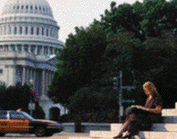
BYU students relish the range of opportunities in Washington BYU interns Romanna Remor, Bryan Rasmussen, Allison Lee, Jennifer Trendler and Dave Brown worked for an embassy, a judiciary agency, a senator, a congressman, and a political consultant respectively.
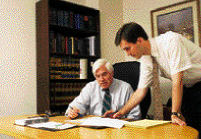 Today’s seminar follows essentially the same pattern Buckwalter established 25 years ago. After four days of work, students attend a weekly class in the form of one or two briefings. Speakers in the briefings have ranged from the president of real estate mogul Freddie Mac to a couple of well-connected Mormons at the CIA. Students are expected to read the Washington Post daily and come to each briefing with a short list of questions. They also write short analyses of a few of the semester’s briefings.
Today’s seminar follows essentially the same pattern Buckwalter established 25 years ago. After four days of work, students attend a weekly class in the form of one or two briefings. Speakers in the briefings have ranged from the president of real estate mogul Freddie Mac to a couple of well-connected Mormons at the CIA. Students are expected to read the Washington Post daily and come to each briefing with a short list of questions. They also write short analyses of a few of the semester’s briefings.
J. Scott Dunaway, manager of the program, emphasizes the value the classes bring to the entire experience. Students who only work in Washington will come away with a relatively narrow perspective of what happens there, he says. “We’re trying to give them the chance to hear from knowledgeable people who can broaden their understanding of issues, their culture and heritage.”
The students recognize the benefits of the course work. “The Friday lectures were extremely helpful,” says Ralf Gruenke, a senior from Erlangen, Germany, majoring in political science. “I didn’t always find myself agreeing, but it certainly helped me look at political issues from a different angle. I think this semester, as far as learning, was almost as valuable as the rest of my stay at BYU.”
Front-Row Seats
This fall, with the culmination of Kenneth Starr’s investigation of the president, was a particularly interesting time to be in Washington. Being in Washington forces students to face social and political issues, and most come away with a better understanding of how governing actually gets done.
Part of that grappling takes place as students gather around the kitchen table and, well, argue.
“A lot of people say you can’t judge because you don’t know the situation,” begins one such discussion on the Clinton scandal.
“I know the situation,” someone interjects. “He’s married!”
“Regardless of whether he’s impeached, he’s destroyed his public image,” says another.
“Yeah, but he’ll go on the lecture circuit . . . “
“But where? Jerry Springer?”
Everyone laughs. It’s not arguing, in the strictest sense of the word. Maybe it’s more like discussing. Whatever one calls it, it’s reassuring. Such informal political discussions are the heart of democracy. And although such discussions can happen in the Morris Center cafeteria as well as in a sub-urb of Washington, the discussions in Washington are followed by chances to sit on the front row of the political arena, with prime views of the events as they unfold.
“The practice of politics is different from the study of politics,” says Kelly Patterson, chair of the Political Science Department and former Washington Seminar participant. “In Washington you experience the subtleties, nuances, and personalities of politics.”
Many of those nuances come from the character of the place itself. One of the city’s most successful climbers, President John F. Kennedy, wryly labeled Washington a town of “Northern charm and Southern efficiency.”
“Washington has a high-activity atmosphere,” notes Jennifer Trendler, a senior from Mesa, Ariz., majoring in journalism. One of 40 students enrolled in this summer’s seminar, Trendler actually began her Washington experience as a congressional page during high school. “People walk up escalators–they don’t just stand there. There’s a lot of things all going on at once. That’s why I wanted to come back.”
The typical Washington workday is long, starting between 8 and 9 a.m. and ending around 7 or 8 p.m.
“Work tends to be the focus of people’s lives out here,” says James Havens, a senior from Broken Arrow, Okla., majoring in international relations. Havens completed an internship with Counterpoint International, an economic and social policy think tank. “A person at my work once stayed in the office for 10 days straight, and most of the senior people in my office come early and stay late.”
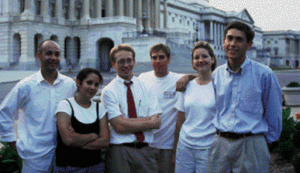
The Washington Seminar gives students first=hand exposure to the halls of history and the practice of politics Gathered near the Capitol are Roman Rubalcava, Danielle Edwards, Michael Bradley, Bryan Rasmussen, Nancy Pulsipher, and Jared Brown
Washington’s Boot Camp
The intensity of activity in the District creates a wealth of experiences for students.
“One year in Washington is equal to five years elsewhere,” says Kathryn Wallace, a recent BYU graduate in humanities and an associate of Jack Anderson, a syndicated columnist based in Washington. “It’s the young unpaid in Washington that are creating ideas and shaping opinions. Working for free isn’t ideal, but here it’s necessary. It’s really the only way to bridge the gap between the experience employers want and the experience you have.”
Opportunities are everywhere. Interns work for lawmakers, committees, agencies, lawyers, judges, interest groups, embassies, newspapers, television networks, and corporations.
Most interns spend a lot of time doing the important but less-glamorous work of getting coffee, making copies, answering phones, and opening mail. An internship is boot camp, a time for the up-and-coming to pay their dues.
If they work hard, successful interns may have the opportunity to research an important issue, take notes at a high-level meeting, write a speech, or draft a position paper.
“People in their 20s basically run this country,” says Trendler, who spent her summer working for Rep. Matt Salmon of Arizona. “With all the bills that come before Congress, it’s inconceivable that one person could be an expert on all the issues.”
Internship sponsors can’t say enough good things about BYU’s interns.
“They are confident, capable, trustworthy–I can’t think of enough adjectives,” says Pat Olson, coordinator of Idaho senator Larry Craig’s intern program. “They’re always composed in interviews, and they are self-motivated. I’ve wanted to keep each and every one of them. They often pick up the least glamorous and most time-consuming jobs, but they are the most critical.”
Emily Huebner, director of court education at the Federal Judicial Center, says her office has been snapping up BYU interns for nearly a decade. “They are included in everything as if they are a staff member. I expect them to speak up, attend meetings, ask questions–any of the things we expect from our other employees.”
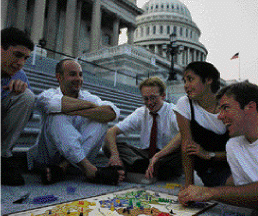
Jared Brown, Roman Rubalcava, Michael Bradley, Danielle Edwards and Bryan Rasmussen play RISK on the steps f the Capitol. The D.C. area abounds with opportunities for adventure, and most student interns play as hard as they work.
Huebner talks specifically about missions. “They bring a lot of poise and maturity. I think the two-year commitment they make allows them to make a contribution right away when they get here.”
Monumental Moments
To imply that seminar participants never play, however, would be a big mistake. There are more free things to do per square mile in the District than anywhere in the United States, and though the interns work hard, they play harder.
The first few weeks of any given semester in Washington are a flurry of travel and sightseeing: the FBI tour (which ends with a live-fire shooting exhibition), the memorials, trips to New York for Broadway shows, Virginia Beach, museums, malls, concerts, and Civil War sites.
Mingled with the profound are plenty of light moments. The Jazz’s trip to the NBA Finals was one of the highlights during the summer of 1998. And it was one of the few times students from the University of Utah and BYU were pulling for the same team. But the morning following Utah’s game-six loss, the interns took considerable ribbing at work.
As semesters wear on, activities like playing the board game RISK and watching the Simpsons TV show become routine. Most recreational time is spent in group activities, but occasionally seminar participants hit the town in pairs. Dunaway jokes that one of the accomplishments of his office is producing a marriage each semester.
Seminar participants also have opportunities to serve. Each group spends at least one Saturday doing volunteer work. A recent group spent their morning weeding and moving rocks at the Center for Creative Non-Violence. Positioned just five minutes from the Capitol, CCNV is the nation’s largest homeless shelter. After their work was finished, the students watched a video about the difference CCNV can make in people’s lives. The video made such an impression that several students decided to volunteer.
“Describing the physica
l events of my work at CCNV is simple but extremely lacking,” says Kristin Lambert, who returned weekly to tutor and complete case studies. “I felt discouraged, scared, hopeful, worried–like I had been hit by a car. Each person had a different story, and I felt a connection to each of them. I left CCNV filled with the kindness the residents showed me. I learned about human dignity and human worth. I learned about mutual acceptance and trust. I learned we are really all the same.”
Some of the more profound learning experiences in Washington don’t come during internships or in class sessions. Jennifer Seegmiller, a senior social work major from Orem, Utah, describes her Labor Day 1998 visit to the Vietnam Memorial as life changing. “I wasn’t born until after the Vietnam War was over, so I didn’t think that the memorial would really mean anything special to me,” Seegmiller says. As luck would have it, Seegmiller got behind a veteran as she walked through the memorial. “At almost every panel, he stopped and touched a name,” Seegmiller recounts. “I assume they were his friends. He started crying uncontrollably. All of this old man’s friends died fighting for the very freedom that I take for granted. I felt ashamed. I hadn’t realized how important–and fragile–my freedom is.”
Being surrounded by history is perhaps the most valuable part of the seminar–it provides a context for the history students observe in the making, and it provides a context for the students’ lives and work. “Historical figures can really come alive when you’re at a spot dedicated to their memory and mission,” asserts Paul Wright, a senior from Rancho Cucamonga, Calif., majoring in political science. “It was while I was visiting the Lincoln Memorial that I realized I came here for first-hand exposure. Being there magnifies the intensity of feeling, remembrance, and attachment to great leaders and the principles they conveyed to us.”
BYU students relish the range of opportunities in Washington. BYU interns (previous page, from left) Romanna Remor, Bryan Rasmussen, Allison Lee, and (above, from left) Jennifer Trendler and Dave Brown (right) worked for an embassy, a judiciary agency, a senator, a congressman, and a political consultant, respectively.
A 1998 BYU graduate, Ashley Baker was a participant in the Washington Seminar this summer. He is now working as an associate with Washington, D.C.-based columnist Jack Anderson.







